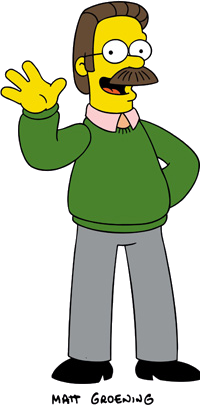Ned Flanders
Nedward "Ned" Flanders Jr. is a fictional character in the American animated television series The Simpsons. He is the Simpson family's extremely religious next-door neighbor and landlord. He is a genuinely well-meaning good-natured person and is one of the few in Springfield to whom that description applies. Thoroughly devout to the point of anachronism, Ned's faith, diligence, and earnestness are at first presented as positive traits, but later episodes of the series show these characteristics in a more problematic light, especially his religious fanaticism and his being overly protective of his two children, Rod and Todd. Despite his flaws, Ned is portrayed as a moral compass and a beacon of integrity and kindness in the community of Springfield, often providing a stark contrast to the values of the Simpson family.
Character Biography[edit | edit source]
Ned Flanders, initially introduced as a supportive neighbor, has evolved into a complex character embodying the extreme of Christian evangelical stereotype. He is a widower, having lost his wife, Maude, in a tragic accident during the series. This event marks a significant turning point in Ned's life, bringing forward themes of faith, resilience, and the challenge of single parenthood. Ned has two sons, Rod and Todd, whom he raises with strict adherence to his Christian faith, often sheltering them from the secular influences of Springfield.
Personality and Traits[edit | edit source]
Ned's most notable traits are his devout Christianity, optimism, and his compulsion to offer unsolicited help and advice, which sometimes annoys his neighbors. He is characterized by his meticulousness and attention to detail, especially in matters of faith and morality. Ned's speech is peppered with diddly, doodly, and other nonsensical rhyming gibberish, which has become his trademark. Despite his goody-two-shoes image, Ned has shown a complex range of emotions and has been depicted as struggling with anger, doubt, and grief.
Role in The Simpsons[edit | edit source]
Ned Flanders serves as a foil to Homer Simpson's character, highlighting Homer's laziness, immorality, and often reckless behavior. The dynamic between Ned and Homer is a central theme in many episodes, with Ned's attempts to spread goodwill often clashing with Homer's selfishness or indifference. However, despite their differences, Ned occasionally shows a deep sense of care and concern for the Simpson family, and Homer has, on rare occasions, reciprocated this sentiment.
Cultural Impact[edit | edit source]
Ned Flanders has become an iconic character in popular culture, representing the archetype of the overly zealous and conservative Christian. His catchphrases and mannerisms have permeated outside The Simpsons, making him a recognizable figure even to those who do not regularly watch the show. Ned has sparked discussions about religion, morality, and neighborliness in modern society, serving as a caricature of evangelical Christians while also offering a critique of religious extremism and intolerance.
Reception[edit | edit source]
Ned Flanders has been well-received by fans and critics alike, with many praising his complexity and the depth of his character development over the series. He has been the subject of academic analysis and discussion, particularly regarding his portrayal of Christianity and its implications for understanding faith in a secular context.
| This article is a stub. You can help WikiMD by registering to expand it. |
Search WikiMD
Ad.Tired of being Overweight? Try W8MD's physician weight loss program.
Semaglutide (Ozempic / Wegovy and Tirzepatide (Mounjaro / Zepbound) available.
Advertise on WikiMD
|
WikiMD's Wellness Encyclopedia |
| Let Food Be Thy Medicine Medicine Thy Food - Hippocrates |
Translate this page: - East Asian
中文,
日本,
한국어,
South Asian
हिन्दी,
தமிழ்,
తెలుగు,
Urdu,
ಕನ್ನಡ,
Southeast Asian
Indonesian,
Vietnamese,
Thai,
မြန်မာဘာသာ,
বাংলা
European
español,
Deutsch,
français,
Greek,
português do Brasil,
polski,
română,
русский,
Nederlands,
norsk,
svenska,
suomi,
Italian
Middle Eastern & African
عربى,
Turkish,
Persian,
Hebrew,
Afrikaans,
isiZulu,
Kiswahili,
Other
Bulgarian,
Hungarian,
Czech,
Swedish,
മലയാളം,
मराठी,
ਪੰਜਾਬੀ,
ગુજરાતી,
Portuguese,
Ukrainian
Medical Disclaimer: WikiMD is not a substitute for professional medical advice. The information on WikiMD is provided as an information resource only, may be incorrect, outdated or misleading, and is not to be used or relied on for any diagnostic or treatment purposes. Please consult your health care provider before making any healthcare decisions or for guidance about a specific medical condition. WikiMD expressly disclaims responsibility, and shall have no liability, for any damages, loss, injury, or liability whatsoever suffered as a result of your reliance on the information contained in this site. By visiting this site you agree to the foregoing terms and conditions, which may from time to time be changed or supplemented by WikiMD. If you do not agree to the foregoing terms and conditions, you should not enter or use this site. See full disclaimer.
Credits:Most images are courtesy of Wikimedia commons, and templates, categories Wikipedia, licensed under CC BY SA or similar.
Contributors: Prab R. Tumpati, MD

